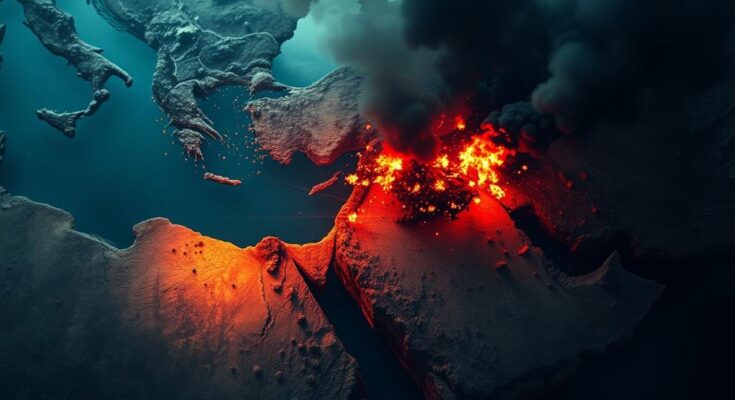Iran-linked militias in Iraq have been responsible for approximately 40 attacks on Israel in recent weeks, marking a significant escalation in proxy hostilities largely driven by regional dynamics and the aftermath of key violent events. Following the death of Hezbollah’s leader, Iran is leveraging lesser-known proxies to strike at its adversaries, further complicating the geopolitical landscape. Analysts emphasize the urgent need for comprehensive insight into this ongoing conflict, which remains underreported in mainstream narratives.
In recent weeks, Iran-aligned militias in Iraq have intensified their attacks against Israel, executing approximately 40 strikes involving missiles, drones, or rockets within a span of two and a half weeks. This escalation marks a significant increase from prior engagements, particularly following the Israeli airstrike that killed Hezbollah’s leader, Hassan Nasrallah, on September 27. The uptick in hostilities can be traced back to the conflict in Gaza that ignited last October, and the current situation reflects Iran’s strategic shift towards lesser-known proxies as it seeks to bolster support for Hezbollah amid its ongoing challenges against Israeli forces in Lebanon. Analysts such as Michael Knights from the Washington Institute have noted, “The number of missiles and drones being fired from Iraq [at Israel] has gone through the roof. They’ve moved into a higher gear to demonstrate their support for Hezbollah.” The situation illuminates not only the intricate dynamics of Iran’s proxy network but also the underlying competition among these factions for prominence within Iran’s broader objective of countering Israeli influence in the region. Iran’s strategy involves utilizing its “axis of resistance” comprised of various militias spread across Syria, Iraq, and Yemen, to reciprocate support in response to the pressures faced from Israel. The proxies, while less equipped than Hezbollah, appear determined to show their capabilities as evidenced by the recent missile and drone launches. Meanwhile, Israel has intensified its retaliatory measures, conducting airstrikes targeting Iranian assets in Syria, which serve as critical supply lines to Hezbollah. The multidimensional conflict landscape was further complicated last month when explosions occurred across Hezbollah communications infrastructure, reportedly due to Israeli sabotage. Kirsten Fontenrose from the Atlantic Council remarked that this incident facilitated international intelligence insights into Hezbollah’s operation networks. With Israel maintaining its focus on preemptive strikes against Iranian-backed forces, the dynamics continue to evolve, making the region a focal point of geopolitical tensions and military strategizing. In parallel, Iranian-backed proxies in Iraq have claimed responsibilities for attacks against US forces, indicating a broader escalation of hostilities within the region. As analysts observe, the conflict, particularly in Iraq and Syria, remains neglected by major media outlets and policy discussions, despite its critical implications for regional stability and international security.
The ongoing hostilities between Iran-linked militias and Israel signify a broader proxy war in the Middle East, with complexities involving multiple factions and regional actors. This rivalry is rooted in the geopolitical interests of Iran, which has historically sponsored militant groups like Hezbollah in Lebanon. The recent escalation in attacks from Iraqi militias signifies a tactical adjustment from Iran, aiming to counterbalance Hezbollah’s weakened position against Israeli offensives. Analysts stress the importance of these developments, which demonstrate Iran’s attempts to consolidate its influence and collaborative efforts among its various proxy groups across the region, thereby increasing the stakes in this multifaceted conflict.
The intensification of attacks by Iran-aligned militias in Iraq against Israel highlights the evolving dynamics of proxy warfare in the Middle East. As these militias respond to Iranian directives in support of Hezbollah, Israel’s retaliatory actions further complicate the conflict landscape. The situation underscores the complexity of regional politics and the need for careful monitoring of interactions among various factions involved. This conflict, having received limited coverage, necessitates greater attention from analysts and policymakers to understand its broader implications for regional and global security.
Original Source: www.theguardian.com




